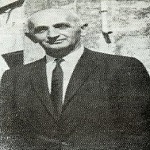 1906- Rexhep Krasniqi was born in Gjakova, was a teacher, clerk, minister of the Albanian state, activist and defender of Albanian rights in the international arena. At the end of 1944 he left together with Xh. Deva, Tahir Zajmin, Rexhep and Xhelal Mitrovica moved to Croatia and then to Vienna, Austria where they came in contact with the allies who accommodated them in a hotel. Called to Europe by the US embassy in 1948 to cooperate with allies on the situation beyond the ‘iron curtain’. In 1951 he left for Australia, together with Xhelal Mitrovica they would publish the newspaper “Vatra shqiptare”. Works in the car industry, at the firm “General Motors”. In early 1956 a US State Department official went to Australia and met with R. Krasniqi, on Deva’s recommendation. In April of that year Mr. Krasniqi receives a telegram from this ministry inviting him to Washington for talks on reorganizing the Committee. After a few days Mr. Krasniqi went to Washington and began conditional talks. In 1994 he was decorated by President Sali Berisha with the title “Naim Frashëri” of the first class. He died on February 13, 1999, leaving a will for his rich library to be donated to Vatra. His friend, publicist, writer and researcher, Mr. took care of his funeral. Idriz Lamaj.
1906- Rexhep Krasniqi was born in Gjakova, was a teacher, clerk, minister of the Albanian state, activist and defender of Albanian rights in the international arena. At the end of 1944 he left together with Xh. Deva, Tahir Zajmin, Rexhep and Xhelal Mitrovica moved to Croatia and then to Vienna, Austria where they came in contact with the allies who accommodated them in a hotel. Called to Europe by the US embassy in 1948 to cooperate with allies on the situation beyond the ‘iron curtain’. In 1951 he left for Australia, together with Xhelal Mitrovica they would publish the newspaper “Vatra shqiptare”. Works in the car industry, at the firm “General Motors”. In early 1956 a US State Department official went to Australia and met with R. Krasniqi, on Deva’s recommendation. In April of that year Mr. Krasniqi receives a telegram from this ministry inviting him to Washington for talks on reorganizing the Committee. After a few days Mr. Krasniqi went to Washington and began conditional talks. In 1994 he was decorated by President Sali Berisha with the title “Naim Frashëri” of the first class. He died on February 13, 1999, leaving a will for his rich library to be donated to Vatra. His friend, publicist, writer and researcher, Mr. took care of his funeral. Idriz Lamaj.
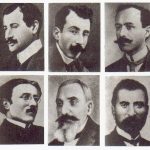 1915 – Arrest of 250 Armenian intellectuals and leaders of this community in Istanbul marks the beginning of the Armenian Genocide. The Armenian Genocide (also known as the Armenian Holocaust) was the systematic mass murder and expulsion of 1.5 million ethnic Armenians in Turkey and neighboring regions by the Ottoman government between 1914 and 1923. A number of countries around the world have officially recognized this genocide. why, Turkey, continues to deny it.
1915 – Arrest of 250 Armenian intellectuals and leaders of this community in Istanbul marks the beginning of the Armenian Genocide. The Armenian Genocide (also known as the Armenian Holocaust) was the systematic mass murder and expulsion of 1.5 million ethnic Armenians in Turkey and neighboring regions by the Ottoman government between 1914 and 1923. A number of countries around the world have officially recognized this genocide. why, Turkey, continues to deny it.
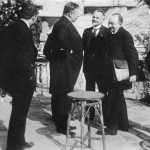 1926 – The Treaty of Berlin is signed by Germany and the Soviet Union. Each pledges neutrality in the event of an attack on another by a third party for the next five years. The treaty reaffirmed the Rapallo German-Soviet Agreement signed in 1922. Ratifications for the treaty were exchanged in Berlin on 29 June 1926 and it entered into force on the same day.
1926 – The Treaty of Berlin is signed by Germany and the Soviet Union. Each pledges neutrality in the event of an attack on another by a third party for the next five years. The treaty reaffirmed the Rapallo German-Soviet Agreement signed in 1922. Ratifications for the treaty were exchanged in Berlin on 29 June 1926 and it entered into force on the same day.
 1957 – During the Suez Crisis, the Suez Canal reopens after UNEF peacekeepers entered the region. The Suez Crisis was an occupation of Egypt in late 1956 by Israel, followed by the United Kingdom and France. The goals were to regain control of the western Suez Canal and remove Egyptian President Gamal Abdel Nasser, who had just nationalized the canal.
1957 – During the Suez Crisis, the Suez Canal reopens after UNEF peacekeepers entered the region. The Suez Crisis was an occupation of Egypt in late 1956 by Israel, followed by the United Kingdom and France. The goals were to regain control of the western Suez Canal and remove Egyptian President Gamal Abdel Nasser, who had just nationalized the canal.
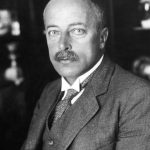 1960 – Max Von Laue dies at the age of 80. Von Laue, was a German physicist who won the Nobel Prize in Physics in 1914 for his discovery of X-ray diffraction from crystals. In addition to his scientific efforts in optics, cryptography, quantum theory, and relativity, he directed German research and scientific development. An opponent of Nazism, he contributed to the restoration of German science after World War II.
1960 – Max Von Laue dies at the age of 80. Von Laue, was a German physicist who won the Nobel Prize in Physics in 1914 for his discovery of X-ray diffraction from crystals. In addition to his scientific efforts in optics, cryptography, quantum theory, and relativity, he directed German research and scientific development. An opponent of Nazism, he contributed to the restoration of German science after World War II.
 1968 – Hashim Thaçi was born in Skënderaj. Thaçi is a Kosovar politician who has held the post of President of Kosovo since April 2016. He was the first Prime Minister of Kosovo, Minister of Foreign Affairs and Deputy Prime Minister in the new cabinet led by Isa Mustafa, who took office on December 12, 2014. He is also known as one of the main founders and exponents of the KLA.
1968 – Hashim Thaçi was born in Skënderaj. Thaçi is a Kosovar politician who has held the post of President of Kosovo since April 2016. He was the first Prime Minister of Kosovo, Minister of Foreign Affairs and Deputy Prime Minister in the new cabinet led by Isa Mustafa, who took office on December 12, 2014. He is also known as one of the main founders and exponents of the KLA.
 1970 – China launches Hong Fang Hong I, becoming the fifth country to place an object in orbit using its own amplifier. It was China’s first space satellite to be part of the Dongfanghong space satellite program. This station was heavier than those in other countries. The satellite carried a radio transmitter that transmitted the national de-facto anthem of the same name. The broadcast lasted 20 days while he was in orbit.
1970 – China launches Hong Fang Hong I, becoming the fifth country to place an object in orbit using its own amplifier. It was China’s first space satellite to be part of the Dongfanghong space satellite program. This station was heavier than those in other countries. The satellite carried a radio transmitter that transmitted the national de-facto anthem of the same name. The broadcast lasted 20 days while he was in orbit.
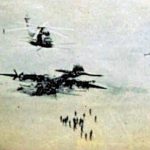 1980 – Eight US soldiers are killed in Operation Eagle Claw as they try to end a hostage crisis in Iran. Operation Eagle Claw, was an operation by the U.S. Armed Forces, ordered by President Jimmy Carter that sought to end the hostage crisis in Iran by rescuing members of the embassy held hostage. The military operation failed after the Iranians shot down the helicopters.
1980 – Eight US soldiers are killed in Operation Eagle Claw as they try to end a hostage crisis in Iran. Operation Eagle Claw, was an operation by the U.S. Armed Forces, ordered by President Jimmy Carter that sought to end the hostage crisis in Iran by rescuing members of the embassy held hostage. The military operation failed after the Iranians shot down the helicopters.
 1996 – In the United States, the 1996 Anti-Terrorism and Death Penalty Act was passed by law into the Criminal Code. The bill was introduced by then-Senate leader Bob Dole and passed with broad support from Congress (91-8 in the U.S. Senate, 293-133 in the U.S. House of Representatives after the 1993 World Trade Center bombings and bombings). of Oklahoma City of 1995. It was signed into law by President Bill Clinton.
1996 – In the United States, the 1996 Anti-Terrorism and Death Penalty Act was passed by law into the Criminal Code. The bill was introduced by then-Senate leader Bob Dole and passed with broad support from Congress (91-8 in the U.S. Senate, 293-133 in the U.S. House of Representatives after the 1993 World Trade Center bombings and bombings). of Oklahoma City of 1995. It was signed into law by President Bill Clinton.






